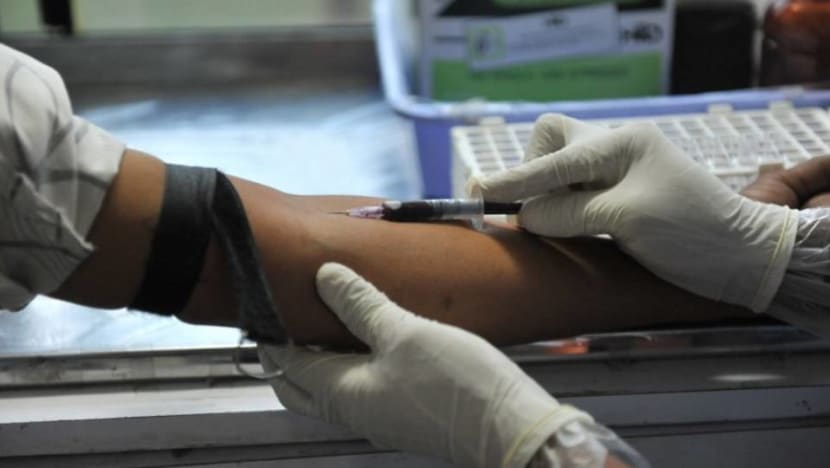171 new cases of HIV infections reported among Singapore residents from January to October
The number of new HIV cases in Singapore is 14 per cent lower compared to the same period last year, says the Ministry of Health.

A healthcare worker draws a blood sample from a man getting tested for HIV/AIDS. (Photo: AFP/ Noah Seelam).
SINGAPORE: A total of 171 new human immunodeficiency virus (HIV) cases were reported among Singapore citizens and permanent residents between January and October this year, said the Ministry of Health (MOH) on Thursday (Dec 1).
In line with World AIDS Day, MOH shared that the figure is 14 per cent lower compared to the same period last year.
In 2021, there were 250 new HIV cases reported, down from 261 the year before.
Out of the 102 reported cases MOH analysed between January and June 2022, 93 per cent were male, and 59 per cent had late-stage HIV infection at the point of diagnosis.
This is 1 per cent lower compared to the same period last year, the ministry said.
MOH added that sexual intercourse remains the main mode of HIV transmission, with 91 per cent of the 102 cases acquiring the infection this way.
Men who have sex with men accounted for 52 per cent of the cases. That figure includes men who engage in bisexual sexual activities, which account for 3 per cent.
Men who have sex with women accounted for 39 per cent, according to MOH.
Among the newly reported cases, 55 per cent of them were detected by HIV tests performed during the course of medical care and "were typically at a late stage of HIV infection", said MOH.
Another 17 per cent of the cases were detected during routine programmatic HIV screening and 15 per cent were detected through self-initiated HIV screening.
The rest were detected through "other forms of screening", the ministry said.
MOH added that a higher proportion of men who have sex with men - at 23 per cent - had their infection detected via self-initiated HIV screening compared to the 8 per cent of heterosexuals.
The total of number of HIV-infected Singapore residents is at 9,231 as of June 2022.
PREVENTING HIV INFECTION
In a Facebook post on Thursday commemorating World AIDS Day, Minister for Health Ong Ye Kung said that while everyone has "been united in facing the COVID-19 pandemic, we must also continue to deal with other diseases that we have been living with, such as HIV and AIDS".
"Advancements in medicines have made HIV, once a disease with an inevitable terminal outcome, to a manageable one, similar to chronic diseases," said Mr Ong.
"Today, people living with HIV can be diagnosed and treated earlier, enabling them to live healthy, productive lives ... These advances have been made possible by the generations of scientists, healthcare professionals and community groups who have worked unitedly for the cause."
MOH advised that the most effective way to prevent HIV infection is to remain faithful to one's spouse or partner and to avoid casual sex, or sex with sex workers.
Those engaging in high-risk sexual behaviour, such as having multiple sexual partners or engaging in casual or commercial sex, are advised to use condoms to reduce the risk of HIV infection and other sexually transmitted infections.
"Condoms should be used consistently and correctly during every sexual encounter. In addition, the use of preventive measures like HIV pre-exposure prophylaxis (PrEP) are highly effective when used as part of a comprehensive HIV prevention strategy," said MOH.
According to the National Centre for Infectious Diseases (NCID), PrEP is "a risk-reduction treatment against HIV which involves the daily consumption of HIV preventive medication".
Going for HIV testing is the only way to know one's HIV status, said MOH, adding that regular testing and early diagnosis allow those living with HIV to be treated early and achieve better treatment outcomes.
MOH and the Health Promotion Board urged individuals at risk to go for regular HIV testing every three to six months.
"A person living with HIV can protect their sexual partner from infection, if they are on regular treatment and have an undetectable viral load," said MOH.
"With early and effective treatment, persons living with HIV can continue to lead lives no different from others."
















